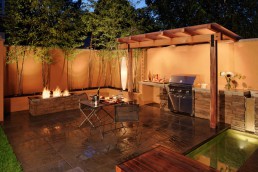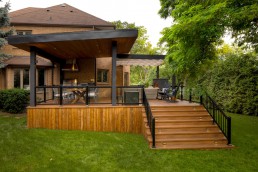Planning an Outdoor Space: Job for Hire vs DIY
You’ve finished planning an outdoor space but still aren’t sure which projects to tackle yourself and which ones require a professional contractor. Be realistic, how qualified are you to handle a power tool? What is your budget? Do you have a set time line?
This article will discuss some of the benefits and drawbacks associated with hiring a contractor versus the DIY approach. Consider the following before making a final decision:
The Advantages of Hiring a Contractor
One of the primary advantages of hiring professionals is the value of their expertise, knowledge, experience, and skills. Contractors also have the right tools and can complete a project in a time efficient manner. Keep in mind, if you start a project and are unable to finish it, you’ll probably pay more money to complete a botched up job than if you hired a pro in the first place. A qualified contractor can save time and money, along with the frustration of costly mistakes.
Are you willing to spend countless weekends working on DIY projects? Hiring a contractor will save you days, weeks, or even months of hard work. If that time comes at the expense of paid work, the cost savings may not be significant.
A professional contractor can also ensure you have the proper permits and paperwork necessary to do a project legally. Lastly, sometimes accidents happen on construction projects. If you hire a licensed and insured contractor, you’ll be protected from additional costs resulting from injuries on the job. Some contractors also offer warranties.
The Advantages of DIY Projects
Of course, one of the advantages of doing projects yourself is saving money. Contractors must make enough money to cover time, labor, tools, materials, insurance, and employee’s salaries while still clearing some profit. Depending on the project, you can save up to 25% to 50% when completing a project yourself. However, when doing the math, keep in mind that contractors can usually purchase materials at a discount and already own the required tools
If you’re handy and find satisfaction in completing home improvement projects, DIY projects can be a rewarding experience and provide a true sense of accomplishment. In addition, you’ll also have complete control over every detail. Are you the type of person who changes your mind often? If so, DIY projects can save you money since a contractor usually charges extra for change orders.
DIY projects have become easier and more convenient. Outdoor living kits are also available and include materials, reinforcements, adhesive, and step-by-step instructions. Home improvement stores offer supplies and tools specifically for the do-it-yourselfer and even host seminars to educate homeowners on projects. In addition, a wealth of information and detailed instructions on a variety of outdoor projects are now available on the Internet.
Difficult Projects That May Require a Contractor
Some projects are much more challenging than others and require the skills of a professional. For example, outdoor living projects that require electrical, plumbing and technical expertise are best left to the pros.
Installation of hardscape for a patio along with retaining walls and other permanent infrastructures that require footings are difficult projects that usually require a contractor. Building a deck is a demanding, time-consuming task that requires at least a basic understanding of construction principles. Since materials are expensive with these projects, even small errors can be costly.
If your outdoor kitchen requires gas lines, electricity, and water, it’s wise to hire a contractor. However, if you want a simple kitchen and are on a tight budget, ditch the sink – building codes and plumbing costs makes this an expensive feature – and consider using propane bottles to fuel your grill. If you choose to tackle this project yourself, research safety issues. For example, never build an outdoor island from combustible materials, including plywood countertops covered with tile.
Constructing a stone fireplace is another difficult project that usually calls for the experience and knowledge of a professional. Those with masonry experience who want to construct their own fireplace should first check city regulations and be informed on safety issues. Other options for DIY enthusiasts include buying a prefabricated outdoor fireplace or you can try to build a less complicated fire pit. Kits for outdoor fireplaces and fire pits are available online and in home improvement stores.
Building an arbor, pergola or trellis requires basic construction knowledge and skills. The level of difficulty varies according to style. However, it is possible to successfully construct these structures with the right materials, tools, construction plans, skills, and motivation. Again, a variety of do-it-yourself kits are available online and in stores.
On the other hand, there are many simple DIY projects you can turn into family projects to save money, have fun, and create your own unique space. Building your own planters, painting an outdoor rug, constructing a bench, creating a meandering pathway, planting a flowerbed or herb garden, or making your own cushions and pillows are all enjoyable projects.
The DIY craze spurred on by home improvement shows combined with the convenience of online information has many homeowners taking on the contractor role. If you’re ready to roll up your sleeves and tackle outdoor living projects, DIY projects can save money. Just keep in mind that projects involving electrical lines or natural gas pipes can cause serious injury and even death and are better left to the pros.
Carefully weigh the pros and cons as listed in this article, assess your skills, consult with staff at home stores, and consult other resources online and in books. Then you’ll be able to determine whether hiring a contractor or the DIY approach is the best route for you to take.
Retractable Solutions for Outdoor Spaces
Please complete the form below to download our free eBrochure.
Price List included



